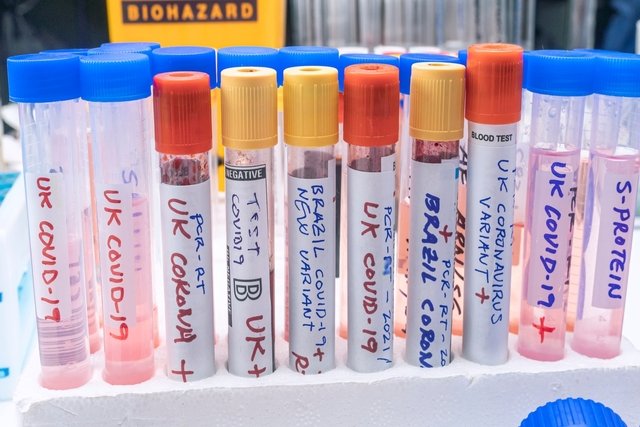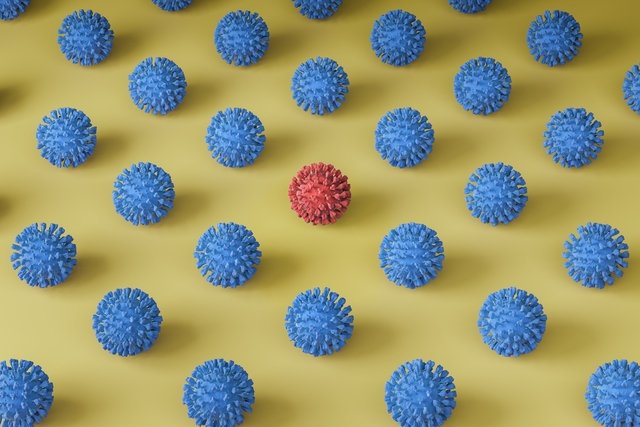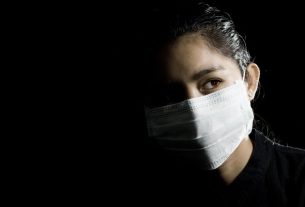COVID-19 variants have greater transmission and infection capacity than the “original” coronavirus. Furthermore, some also have greater resistance to the immune system, which can increase the time of infection and the risk of serious complications.
The main symptoms of the variants remain the same as those of infection with the “original” virus, including dry and persistent cough, excessive tiredness, headache, muscle pain and diarrhea. But some variants are more prone to one type of symptoms than others.
In general, what is known so far is that COVID-19 variants are, in fact, easier to transmit and cause infection due to mutations in the S protein, present on the surface of the virus. However, more studies continue to be carried out to evaluate the behavior of these variants and their effects on the body.

Main symptoms of each variant
Symptoms of COVID-19 may vary slightly depending on the variant:
Although the table indicates the most common symptoms, it is possible that a person infected with the delta variant, for example, also presents symptoms that were mainly associated with the alpha variant. Therefore, to confirm the type of variant responsible for COVID-19, it is important that specific tests are carried out. Take our online test to find out if you may be infected with COVID-19.
Identification of the variant is important for epidemiology, as knowing the characteristics of the most circulating virus in the region makes it possible to establish more effective virus identification, surveillance, prevention and infection control measures.
What is the most serious variant?
Despite causing very similar symptoms, the alpha and delta variants have been associated with more serious infections and a number of deaths. See what to do to prevent SARS-CoV-2 infection.
Variants of Concern
According to the WHO, the variant considered to be of concern is the omicron, along with its subvariants.
Variants of interest
The variants of interest are those that have been associated with the occurrence of diseases and that have transmission potential. Currently, this category includes Ômicron variant (XBB.1.5), the Arcturus variant (XBB.1.16), the EG.5 variant, the BA.2.86 variant and the JN.1 variant, also called Pirola.
Previously, the following were also considered as variants of interest and/or concern:
- Alfa (B.1.1.7)first identified in the United Kingdom;
- Beta (B.1.351/ B.1.351.2/ B.1.351.3)first identified in South Africa;
- Gama (P.1/ P.1.1/ P.1.2)first identified in Brazil;
- Delta (B.1617.2)first identified in India.
These variants are no longer considered to be of concern due to the effectiveness of the actions taken by the World Health Organization that aimed to reduce the circulation of these variants and their impact on the world population.
Variants in monitoring
Currently, the SARS-CoV-2 variants considered under monitoring are:
The variants being monitored are those that have genetic changes that could represent a future risk, but their characteristics and epidemiological impact are still being studied.
Does the vaccine work against the variants?
To date, all available vaccines are effective against circulating variants, and it has been verified that the administration of the vaccine is capable of effectively stimulating the immune response, reducing virus transmission and the incidence of infection. However, new studies are being carried out to assess the duration of immunity against these variants, as well as the effect on possible new mutations of the virus.
Furthermore, Pfizer’s bivalent vaccine is capable of guaranteeing protection against the variants in circulation, including omicron and its subvariants, and is therefore recommended that the entire population takes this vaccine.
Learn more about COVID-19 vaccines.
Is it possible to have two variants at the same time?
Although it is considered an extremely rare situation, becoming infected with two variants of COVID-19 at the same time is possible. So far, few cases have been registered, however contamination by two variants simultaneously has already been identified in patients in Brazil and Belgium. According to reports, infection with two variants does not appear to produce more severe symptoms.
Bibliography
- UNASUS. XBB.1.16, aka “Arcturus”, is the newest variant of interest of SARS-CoV-2, can cause conjunctivitis, and continues to spread around the world. 2023. Available at: <https://www.unasus.gov.br/especial/covid19/markdown/623.>. Accessed on May 11, 2023
- NATURE. Heavily mutated coronavirus variant puts scientists on alert. Available at: <https://www.nature.com/articles/d41586-021-03552-w>. Accessed on 26 Nov 2021
- POUWELS, KOEN B.; PRITCHARD, EMMA; MATTHEWS, PHILIPPA C. Impact of Delta on viral burden and vaccine effectiveness against new SARS-CoV-2 infections in the UK . 2021. Available at: <https://www.ndm.ox.ac.uk/files/coronavirus/covid-19-infection-survey/finalfinalcombinedve20210816.pdf>. Accessed on Aug 25, 2021
- EUROPEAN CENTRE FOR DISEASE PREVENTION AND CONTROL. SARS-CoV-2 variants of concern as of 8 July 2021. Available at: <https://www.ecdc.europa.eu/en/covid-19/variants-concern>. Accessed on Jul 14, 2021
- JR, Ronaldo SF et al. Pervasive transmission of E484K and emergence of VUI-NP13L with evidence of SARS-CoV-2 co-infection events by two different lineages in Rio Grande do Sul, Brazil. medRxiv. 2021
- WHO. Tracking SARS-CoV-2 variants. Disponível em: <https://www.who.int/en/activities/tracking-SARS-CoV-2-variants/>. Acesso em 11 mar 2024
- XIE, Xuping; ZOU, Jing; FONTES-GARFIAS, Camila R. et al. Neutralization of N501Y mutant SARS-CoV-2 by BNT162b2 vaccine-elicited sera. bioRxiv. 2021
- WHO. The effects of virus variants on COVID-19 vaccines. Disponível em: <https://www.who.int/news-room/feature-stories/detail/the-effects-of-virus-variants-on-covid-19-vaccines?gclid=CjwKCAjw47eFBhA9EiwAy8kzNIoJrQIt73nEfA4gR-J8MhMmplc9VpJ7L0njnVoy8-YBY6WnTD5MGxoCPi0QAvD_BwE>. Acesso em 27 mai 2021
- NOVAX. Novavax COVID-19 Vaccine Demonstrates 89.3% Efficacy in UK Phase 3 Tria. 2021. Available at: <https://ir.novavax.com/node/15506/pdf>. Accessed on May 27, 2021
- JOHNSON & JOHNSON. Johnson & Johnson COVID-19 Vaccine Authorized by U.S. FDA For Emergency Use – First Single-Shot Vaccine in Fight Against Global Pandemic. Disponível em: <https://www.jnj.com/johnson-johnson-covid-19-vaccine-authorized-by-u-s-fda-for-emergency-usefirst-single-shot-vaccine-in-fight-against-global-pandemic>. Acesso em 27 mai 2021
- SHEN, Xiaoying; TANG, Haili; MCDANAL, Charlene et al. SARS-CoV-2 variant B.1.1.7 is susceptible to neutralizing antibodies elicited by ancestral spike vaccines. Cell Host & Microbe. Vol 29. 529 539, 2021
- EMARY, KATHERINE RW; GOLUBCHIK, TANYA ET AL. Efficacy of ChAdOx1 nCoV-19 (AZD1222) Vaccine Against SARS-CoV-2 VOC 202012/01 (B.1.1.7). Available at: <https://papers.ssrn.com/sol3/papers.cfm?abstract_id=3779160>. Accessed on March 18, 2024
- THE NEW YORK TIMES. Coronavirus Variants and Mutations. Available at: <https://www.nytimes.com/interactive/2021/health/coronavirus-variant-tracker.html>. Accessed on May 27, 2021
- EUROPEAN CENTRE FOR DISEASE PREVENTION AND CONTROL. SARS-CoV-2 variants of concern as of 24 May 2021. Available at: <https://www.ecdc.europa.eu/en/covid-19/variants-concern>. Accessed on 31 Jul 2023
- ACROBIOSYSTEMS. Emerging mutants from SARS-CoV-2 Variants. Disponível em: <https://www.acrobiosystems.com/A1226-SARS-CoV-2_spike_mutants.html?gclid=CjwKCAjw47eFBhA9EiwAy8kzNCUo_CcSyaEIC169pnSLu__Z2vg7xf4gBe_7suHt43nEtW9ML_s1yhoCNewQAvD_BwE>. Acesso em 26 mai 2021
- FARIA, Nuno R.; BETWEEN, Thomas; WHITTAKER, Charles. Genomics and epidemiology of a novel SARS-CoV-2 lineage in Manaus, Brazil. medRxiv. 2021
- CDC. SARS-CoV-2 Variant Classifications and Definitions. Disponível em: <https://www.cdc.gov/coronavirus/2019-ncov/variants/variant-info.html?CDC_AA_refVal=https%3A%2F%2Fwww.cdc.gov%2Fcoronavirus%2F2019-ncov%2Fcases-updates%2Fvariant-surveillance%2Fvariant-info.html>. Acesso em 26 mai 2021
- TEGALLY, Houriiyah; WILKINSON, Eduan; GIOVANETTI, Marta et al. Detection of a SARS-CoV-2 variant of concern in South Africa. Nature. Vol 592. 438-443, 2021
- CHALLEN, Robert; BROOKS-POLLOCK, Ellen; READ, Jonathan M. et al. Risk of mortality in patients infected with SARS-CoV-2 variant of concern 202012/1: matched cohort study. BMJ . 2021
- GRINT, Daniel J.; WING, Kevin; WILLIAMSON, Elizabeth et al. Case fatality risk of the SARS-CoV-2 variant of concern B.1.1.7 in England, 16 November to 5 February. Euro Surveill. Vol 26. 11 ed; 2021
- VOLZ, Erik; MISHRA, Swapnil; CHAND, Meera et al. Assessing transmissibility of SARS-CoV-2 lineage B.1.1.7 in England. Nature. Vol 593. 266-270, 2021
- DAVIES, Nicholas G.; ABBOTT, Sam; BARNARD, Rosanna C. et al. Estimated transmissibility and impact of SARS-CoV-2 lineage B.1.1.7 in England. Science. Vol 149. 9 ed; 2021
- GALLOWAY, Summer E.; PAUL, Prabasaj; MACCANNEL, Duncan R. et al. Emergence of SARS-CoV-2 B.1.1.7 Lineage — United States, December 29, 2020–January 12, 2021. US Department of Health and Human Services/Centers for Disease Control and Prevention. Vol 70. 3 ed; 95-99, 2021
- VIROLGICAL.ORG. Preliminary genomic characterisation of an emergent SARS-CoV-2 lineage in the UK defined by a novel set of spike mutations. Disponível em: <https://virological.org/t/preliminary-genomic-characterisation-of-an-emergent-sars-cov-2-lineage-in-the-uk-defined-by-a-novel-set-of-spike-mutations/563>. Acesso em 26 mai 2021
- CASCELLA, MARCO; RAJNIK, MICHAEL; ALEEM, ABDUL. Features, Evaluation, and Treatment of Coronavirus (COVID-19). Available at: <https://www.ncbi.nlm.nih.gov/books/NBK554776/?report=reader>. Accessed on May 26, 2021

Sign up for our newsletter and stay up to date with exclusive news
that can transform your routine!
Warning: Undefined array key "title" in /home/storelat/public_html/wp-content/plugins/link-whisper-premium/templates/frontend/related-posts.php on line 12
Warning: Undefined array key "title_tag" in /home/storelat/public_html/wp-content/plugins/link-whisper-premium/templates/frontend/related-posts.php on line 13




